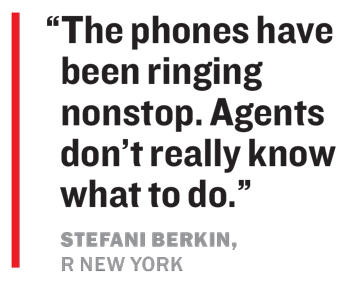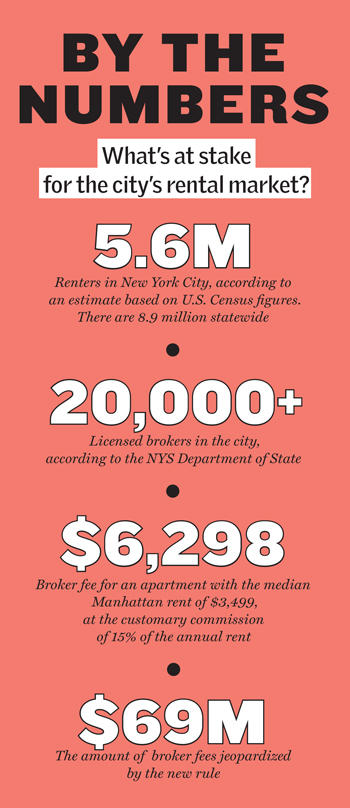Sarah Saltzberg got an email just after 9 p.m. on Feb. 4 alerting her that state regulators had issued guidance banning most tenant-paid broker fees.
“This blindsided us,” she said. “The sky is blue. Now all of a sudden the sky is red. Change your entire business model.”
Saltzberg — one of more than 20,000 licensed real estate brokers in New York City — leads Bohemia Realty Group, a 152-agent firm that focuses on rentals in Upper Manhattan.
The Department of State’s interpretation of last June’s sweeping rent-law reforms banned the routine practice of charging tenants for their fee when representing the landlord. When The Real Deal broke the news of the ban, it threw the brokerage industry into turmoil until a judge put a temporary hold on the new rule less than a week later.
And the guidance, should it become official, could put at stake more than $69 million in broker fees, according to an analysis of over 12,000 listings — assuming a maximum 15 percent of annual rent — on Localize.city’s platform.
Related: Rental firms grieve over brokerage fees
Now the entire business model of most rental brokerages is in limbo, forcing firms to make tough choices as they plan for survival if the change remains in place. Meanwhile, landlords are hiking rents to cover the fees and rethinking whether to use brokers at all. And a few opportunistic proptech startups are eyeing the upheaval as just the sort of market disruption they were born to exploit.
“There’s just a lot of uncertainty right now,” said Evan Rugen, an agent with R New York who typically works on behalf of landlords.
Rugen received a text from three prospective tenants on Feb. 10 saying their lawyer had told them they didn’t have to pay his broker fee — even though Rugen was a dual agent in the deal, meaning he was not just representing the landlord, he was also representing the tenants. Rugen grew concerned the tenants would not pay him for the work he had put in showing the East Village apartment they were planning to rent.
 But as he was preparing to respond to the text, Rugen said, he read TRD’s follow-up story about the judge’s ruling that day suspending the fee ban. Rugen said he sent the tenants the article about the moratorium, and they agreed to pay the 9.5 percent fee.
But as he was preparing to respond to the text, Rugen said, he read TRD’s follow-up story about the judge’s ruling that day suspending the fee ban. Rugen said he sent the tenants the article about the moratorium, and they agreed to pay the 9.5 percent fee.
Such is the sense of whiplash and confusion that rippled across the industry last month between news breaking of the new rule and the lawsuit by the Real Estate Board of New York that secured the temporary restraining order.
The stay does grant a brief reprieve, at least until REBNY has its day in court on March 13, leaving brokerages, agents, renters and landlords with little more certainty than the day the new guidance dropped. And even after the judge’s ruling, confusion reigns.
“I just have people texting me, ‘Oh, it’s illegal that you’re charging a broker fee,’” Rugen said. “And it sucks.”
“Havoc and confusion”
After state officials issued the surprise guidance, panic consumed the industry as firms and brokers scrambled to understand what the rule meant — and what it didn’t.
“The phones have been ringing nonstop,” said Stefani Berkin, president of R New York, the week TRD broke the news. “Agents don’t really know what to do.”
She said the firm’s lawyers have been standing by for questions about individual deals. Mike Walker, R New York’s residential sales manager, quickly put together a seminar on Feb. 6 to answer agents’ questions.
Suddenly overturning such a fundamental part of New York’s vast rental market unleashed immediate chaos, with both brokers and renters unsure of what the change really meant. Since the new guidance was an interpretation of a law that passed last June, many wondered if fees paid since then were even legal.
“It’s a mess,” said one brokerage chief who spoke on the condition of anonymity. “People are lining up looking for refunds. Everyone thinks there’s no such thing as a tenant-paid broker commission.”
The DOS clarified on Feb. 6 that the guidance was not retroactive.
The lawmakers behind the rent law said the change was meant to eliminate barriers for tenants seeking housing. But industry leaders called it a “body blow” to both landlords and rental agents, and a “death knell” for some brokerages.
Less than a week after the new guidance was released, lawyers for REBNY, the New York Association of Realtors and 12 brokerage firms headed to court in Albany and won the stay, decrying the “havoc and confusion” wrought by regulators’ “unlawful, erroneous, and arbitrary” interpretation of the law.
No shelter
The temporary hold on the new policy didn’t stop it from doing immediate damage to both renters and brokers.
Because the new rule would require landlords to pay their brokers, industry insiders warned that fees — typically 15 percent of annual rent — would inevitably be priced into rents. And a study published just over a week after the change found that’s exactly what happened. Rents went up an average of 6 percent for 7,000 apartments studied, and listings that went from showing a tenant-paid broker fee to a landlord-paid fee showed higher rent hikes, the study by PropertyClub found.
No-fee listings are also proliferating since the guidance came out. In 2019, 55 percent of StreetEasy rental listings were no-fee. But as of Feb. 11, less than a week after the ban made headlines, that jumped to nearly 65 percent.
“I do worry that a few landlords will stop working with brokers, and that’s not necessarily a good thing for tenants,” said Michael O’Brien, a broker with Bohemia. “Because we do a lot of legwork in getting people approved and pleading cases for applications.”
That pullback is exactly what’s happening, as landlords worry about being on the hook for the fees of any brokers they engage before the new landscape is clarified.
Related: Rental chaos raises tensions between tenants and landlords
“Right now, until I get a clear and concise interpretation, I’m going to rent on my own,” said Chris Athineos, whose family owns 150 apartments in Brooklyn. “I don’t want to put the broker at risk or put myself at risk.”
Getting cut out of the process would be a severe blow to agents and brokerages specializing in the rental market, who are already dealing with the impact of the cap on application fees.
“The rental business in New York City is not an ultra-lucrative business,” said Jed Wilder, who has an eight-person team at Compass. “Basically, for the majority of agents doing rentals — they can’t afford at all to live in the apartments that they’re showing.”
Corcoran Group COO Gary Malin initially downplayed the guidance in an email to staff, saying it “merely represents the opinion of the DOS.”
But in an affidavit filed with the lawsuit, Malin framed the new guidance as an existential threat to his firm and its brokers.
“The recent memorandum from the New York Department of State … threatens both the future of Corcoran, as well as the livelihood of our over 2,400 agents,” he said.

